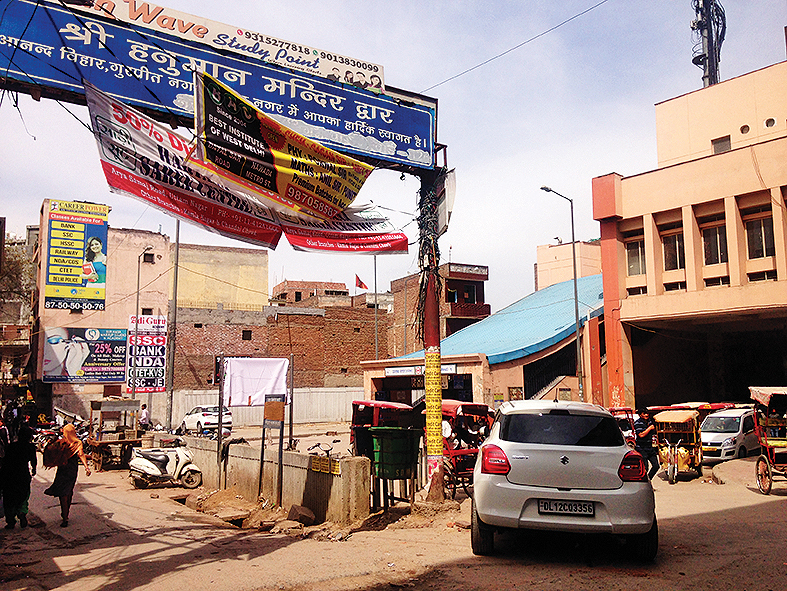Shopkeepers in the area remember the shock of demonetisation and continue to suffer from neglect by the civic authorities
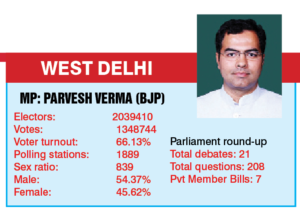
The West Delhi constituency is a perfect example of the state of planning in Delhi — or the lack of. While you have the wide stretch of roads and empty spaces with parks in inner Dwarka, just as you exit, cramped spaces and street corners in a constant state of construction greet you — and run all the way to Najafgarh and Uttam Nagar.
In Uttam Nagar, the situation is very much apparent. Harinandan Sahni, 61, who has lived here since 1994 describes the disarray: “They first built the homes and then they decided to make the sewage lines”.
But in 2013 and 2015 Assembly elections and even in 2014 Lok Sabha elections, when the things that mattered most were drinking water, electricity, education and health, for Sahni, these things don’t matter. “We get water, electricity is also fine, and the hospital around the corner is not the best but it’s better than nothing. My children are grown so I don’t worry about education. For me what matters is nationalism and that’s why I will only vote for (Narendra) Modi”.
Sitting in the shop he had opened just 10 months ago where he has one table with his sewing machine and his chair and a bench for his customers, he says he doesn’t believe that much development has taken place since AAP took over the reins in the Capital. While the sitting MP, Parvesh Verma, is from the BJP, he doesn’t find any mention in Sahni’s argument.
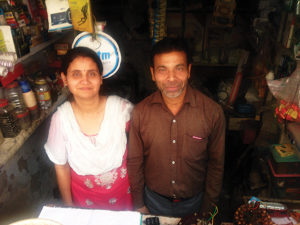
Just as he explains his point of view, Sudaidhan Sharma comes in and joins us. Sharma, who moved from Pakistan’s Sialkot during the Partition, says what matters to him is a good education system. “Schools have become much better and my grandchildren go to government ones,” he says. For him, having AAP in the area has changed a lot and he doesn’t expect his friend Sahni to understand that.
What irks him a great deal is the job prospects in the area. “If you want to earn properly, you cannot work around this area because all you will get is working in some shop or some small company who will give you far below the minimum wage”.
This 82-year-old’s 41-year-old son has been jobless for a few months now. “He hasn’t found any suitable job. He gets offered about Rs 9,000 only”. He also sympathises with the plight of young girls who work in shops and earn much below the minimum wage, working 12 hours a day. “The government is unable to provide good jobs nor ensure proper wages”, he says.
For him these are matter of great concern, as his joint family — including his son and family — live with him and his wife on their pension.
After a long conversation, we take our leave and walk further down the lanes. We meet a family that runs an electrical store along with being purveyors of homes from a small corner store. This colony right behind the Metro station has unkempt streets, like a job done in haste. The sewage lines covered with different sizes of slabs don’t sit right and open up creating a dangerous hole for people to fall into.
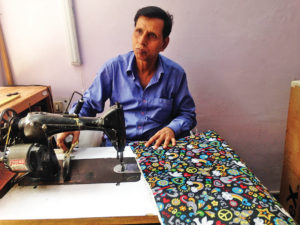
Rakesh Kumar Ranjan and his wife Rajneesh stand with their eldest child discussing how her 10th grade exam has gone. They take out time to explain their problems and what needs to be on the lips of the politicians who will come seeking votes.
First, like others, they speak about the stagnant drains from which dirty water trickles into their homes. Even their shop has water seeping in because of a busted drain which they have to constantly fix at a different spot. The biggest contention is the sanitation problem and also security, with the whole area lacking CCTV cameras.
“Every time they say police will look after it. But how many police personnel do we have? How many can they look at?” Rakesh points out that at least with CCTVs they would be able to identify criminals.
But the problem, Rakesh says, is that the government is happy with itself and will only start caring when the elections come. “Just see, soon they will start distributing samosas, shawls, blankets and even liquor. And the people are foolish so they will take these freebies and vote. For a Rs 300 blanket your whole life can go into disarray”.
Corrupt and the criminal
When in 2016, 500 and 1,000-rupee notes were demonetised, it shook the entire nation. Everyone felt its blows, especially traders who suffered heavy losses during the aftershocks of this snap decision.
Rakesh too was affected by it. He says people like him in the entire area suffered. “Only if someone has money will they come and buy something from us. So, if people didn’t have money, what would they buy?” he asks.
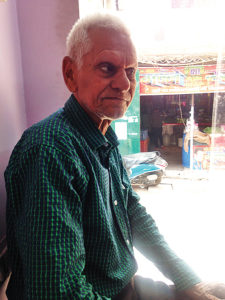
“All us shopkeeper brothers are surviving on little. If you wanted to end corruption then you should have gone fully digital. Why did they not do so?”
He then points to the banners dangling in his shop spelling out Paytm and digital money cash transfers. “This is how all shops should run. Anything above Rs 100 should be paid digitally”.
What the big note of Rs 2,000 has done, Rakesh says, is just allowed someone to ask for bigger bribes. “Earlier they may have asked for Rs 50 or Rs 100 now they directly ask for the rose colour (the colour of the Rs 2,000 note)”.
The government, he says, disrupted everything. Just by replacing Mahatma Gandhi’s face from one note to the other, Rajesh says corruption cannot be fought.
“We don’t have money and we were the ones affected. The ones who have all the money are keeping it without paying taxes. They didn’t stand in line for exchanging note. We are so dirty that we don’t have any work that’s why we had time to stand in the queue”, he adds sarcastically, “they all play politics on us.”
And that’s why, he says his shop which has been owned by his family for the last 25 years has been unable to bring them prosperity.
His next point of contention is the implementation of the Goods and Services Tax (GST). “The rate is too high and it should have one proper charge. Instead the cost keeps increasing and the customer too does not want to pay GST.”
For him what matters most now is a party which will be able to give his area a good stable governance, who will work for the betterment of the people, for the traders and at the same time provide good water facilities and better education. “When you open your eyes the first thing you see is the neighbour. So, the neighbour should be good. We only care about the person who will stand in the elections for MP from West Delhi.”
One important factor he points out is that the candidate he would vote for should not have any criminal cases against him. He and his wife don’t look at who is “from Rajasthan or who is from Gujarat. We don’t care about religion or caste, we care about the leader in the position. I don’t mind if Modi comes or Mayawati or Manmohan. If no one can promise us something concrete then we will vote NOTA (None of the Above)”.
He gives the examples of leaders like Lal Bahadur Shastri and Lala Rajpat Rai, who “were spotless.” Now “all leaders that are coming up are thieves and murderers.”
And when such people are given power, it impedes development, and then “it will just be like the British coming here and ruling over us”. He lastly adds, as his wife and child look at him with smiles on their lips: “If a corrupt person is being given a ticket then you should know that the entire party is corrupt and should not be voted to power”.
Criminal record
The current MP of West Delhi, Parvesh Verma, won by 6,51,395 votes, almost double that of the runner up, AAP’s Jarnail Singh.
He has a criminal case pending against him from 2011. The case where cognisance has been taken includes IPC sections 147, 148, 149, 186, 188, 332, 353. Section 332 is a charge related to voluntarily causing hurt to deter public servant from his duty and Section 148 related to rioting and armed with deadly weapon.
Reports say he may again contest the elections. The other supposed hopefuls are Pawan Sharma and Kamaljeet Sehrawat. The former has two criminal cases against him. One where charges have been framed include IPC sections 147, 148, 149, 186, 332, 353. The second case where cognisance has been taken has IPC sections 147, 149, 353, 186, 332, 323, 427, 440. Here one of the notable ones is IPC Section 353, which relates to two charges of assault or criminal force to deter public servant from discharge of his duty (IPC Section 353).
Sehrawat has no reported criminal charges. For the Congress, the man who lost the last elections in 2014 may again run this time around. Mahabal Mishra has two criminal cases against him of a more serious nature.
One case under IPC sections 346, 34, 366, 368 is pending in the Delhi High Court. These charges include one charge related to kidnapping, abducting or inducing woman to compel her marriage, etc., under IPC Section 366; then 1 charge related to wrongfully concealing or keeping in confinement, kidnapped or abducted person under Section 368; and one charge related to wrongful confinement in secret, IPC Section-346.
The other case has Sections 147, 148, 149, 353, 332, 308, 186, 171F. Section 308 is related to attempt to commit culpable homicide and Section 171F relates to undue influence or personation at an election.
The other two probables in the Congress race for West Delhi seat are Devender Yadav and Yoganand Shastri. Neither has criminal cases against hi.
AAP has already announced its candidate. Advocate Balbir Singh Jakhar is president of the Dwarka Court Bar Association and chairman of the co-ordination committee of the All Delhi District Court Bar Association. No information is available on any website about criminal charges against him.

